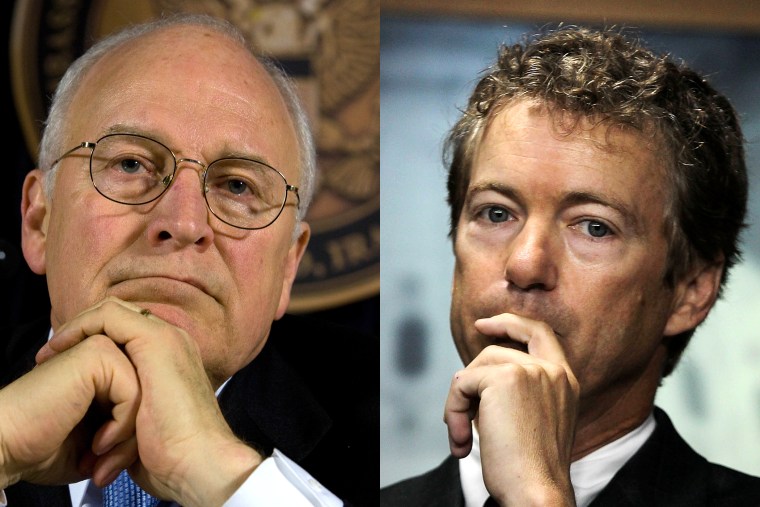Senator Rand Paul and former Vice President Dick Cheney sparred over Iraq on Sunday in dueling TV appearances, with the Kentucky Republican blaming the Bush administration for the current crisis and Cheney accusing President Obama of inviting "another 9/11."
"I don’t blame President Obama. Has he really got the solution? Maybe there is no solution."'
Paul, who has long called for reducing American involvement in foreign conflicts, suggested in an appearance on NBC’s "Meet The Press" that Cheney lacked credibility in the debate. In a Wall Street Journal op-ed last week, the ex-vice president and daughter Liz Cheney wrote: "Rarely has a U.S. president been so wrong about so much at the expense of so many."
“You know, were they right in their predictions? Were there weapons of mass destruction there? Was the war won in 2005, when many of those people said it was won?” Paul asked.
Paul said that he did not see recent insurgent gains as a failure of the Obama administration, but as one of a number of dire consequences of the second Iraq War.
“I don’t blame President Obama,” Paul said. “Has he really got the solution? Maybe there is no solution. But I do blame those who are for the Iraq War for emboldening Iran. These are the same people now who are petrified of what Iran may become, and I understand some of their worry.”
The Islamic State of Iraq and Syria (ISIS), a radical Sunni insurgency, has taken over large swaths of Iraq in recent weeks with much of the American-trained Iraqi military abandoning its posts in Sunni cities. In recent days, ISIS forces have reportedly seized border crossings with Syria and are threatening the country’s largest oil refineries. Shiite fighters have taken to the streets in Baghdad, pledging to repel any advance on the nation’s largest city and raising the specter of a broadening sectarian war in the region.
Paul did criticize the Obama administration for supplying aid to rebels in Syria engaged in a brutal civil war against dictator Bashar al-Assad, rebutting Republican and Democratic hawks who argue the White House should have backed moderate anti-Assad factions even earlier to foster an alternative to the radical Islamic State of Iraq and Syria.
“I personally believe [ISIS] would not be in Iraq and not be as powerful if we had not been supplying their allies in the war,” Paul said. Without American aid, he suggested that Assad might have “wiped these people out months ago.”
"Rand Paul, with all due respect, is basically an isolationist. He doesn’t believe we ought to be involved with that part of the world."'
In a separate interview with CNN’s "State of the Union," Paul said countries like Iraq and Libya where the US had intervened militarily had become a “jihadist wonderland” and predicted the same fate for Syria if Assad fell.
Cheney, in an appearance on ABC’s "This Week With George Stephanopolous," rebutted Paul’s charge that his previous failures to predict developments in Iraq and stabilize the country made his views less relevant.
"If we spend our time debating what happened 11 or 12 years ago we're going to miss the threat that is growing,” Cheney said. “Rand Paul, with all due respect, is basically an isolationist. He doesn’t believe we ought to be involved with that part of the world.”
Cheney offered few specific prescriptions for how to handle the crisis in Iraq, instead accusing Obama of a broad failure to confront gathering threats in Pakistan, North Korea, Syria, and elsewhere.
“I think at this point there are no good easy answers in Iraq,” he said.
